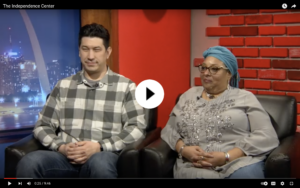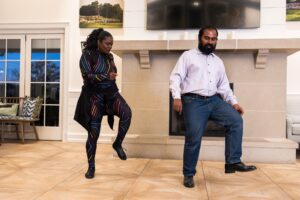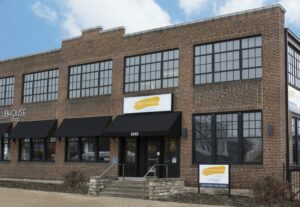
Copyright © 2018 Independence Center. All rights reserved
Home / Overcoming Obstacles: Brittny’s Story
Two years ago, Brittny felt invisible, lost to herself and the world after more than a decade of mental illness and drug abuse.
“I had no clue about the Clubhouse community,” she said. “I had no clue there was help out there for people with mental illness. I was in a rut mentally and psycho- logically, and I’d been isolating in a big way for a long, long time.”
In October, after one and half years of psychosocial rehabilitation at Independence Center, Brittny, 34, stepped into her rightful place in the spotlight. Wearing a floral dress with a pop of vibrant yellow, she delivered a fifteen-minute monologue to a packed ballroom about her journey from desperation to recovery, bringing more than 600 people to their feet and many to tears.
Brittny was one of the opening plenary speakers at the 17th International Club- house Seminar, held at the St. Louis Ball- park Hilton this past fall. She gave a brave, unflinching narrative about being the victim of sexual abuse, living with schizoaffective disorder and self-medicating with drugs. “The Clubhouse has been a life-saver to me,” she told the crowd.
Since becoming a member, Brittny shared that she has quit smoking, returned to school and has imple- mented an exercise regimen for herself. She’s fallen in love with Stanley, another Clubhouse member. “Being a member of the Clubhouse community has afforded me several opportunities to be part of something bigger than myself,” she said.
Brittny joined Independence Center in April 2012, shortly after two workers reached out to her through a special statewide program that targets high cost Medicaid clients who also have chronic medical and mental health conditions. The Disease Management 3700 Project (DM 3700), a collaboration between the Department of Mental Health and MO Health Net, represents a seismic shift in how Medicaid has traditionally been administered. Instead of waiting for clients with mental illness to use the health care system on their own (often inefficiently and with poor results), the state seeks them out and invites them to enroll in a Community Mental Health Center (CMHC), such as Independence Center, where they can find help managing both their physical and mental health care needs. That outreach, Brittny told the crowd, “saved my life.”
Now, Brittny spends five days a week at Independence Center. She treats it like a full workday, arriving around 10 a.m. and leaving just before 6 p.m. The only time she misses is when she has a doctor’s appointment (she suffers from degenerative disc disease and osteoar- thritis). She also receives counseling and psychiatric medication through Midwest Psychiatry, the Center’s outpatient psychiatric program.
Brittny, who enjoys writing poetry, reading murder mysteries and African American fiction and listening to “all kinds of music,” says her life, though still chal- lenging, has never been better. “There’s so much out there for me,” she said.
Brittny sees a very bright future for herself. Once she completes her bachelor’s degree in psychology (she is currently a sophomore at the University of Phoenix), she wants to obtain her master’s in social work or clin- ical mental health counseling so she can help those who’ve experienced many of the same challenges. Despite the many years of struggle, Brittny says she is thankful. “Everything I’ve seen or been through is the sum of the woman I am today.”
After her plenary address, dozens of people lined up to shake her hand, hug her and share their own strug- gles. “I can honestly say I’ve never had that experience before, and that’s what I guess made it surreal to me because I didn’t know just how powerful my story was and how it affected people until that day.”
But being in the spotlight is something Brittny may have to get used to. Weeks before she spoke at the Clubhouse conference, Independence Center Execu- tive Director Mike Keller asked Brittny to give her testi- mony at Medicaid expansion hearings at Forest Park Community College. Her powerful story drew more comments than any other of the nearly 100 speakers.
“Despite everything that I’ve gone through traumati- cally, and the pain I’ve endured, and the mental illness, I was able to overcome a lot of those obstacles thrown in my path,” she said. “I’m still here. I’m still standing. I didn’t let all that stuff kill me. And now it seems that I’m being called to share my story with others.”
Click Here to download the full Fall 2014 issue in PDF.




Come see first-hand how our programs and services restore lives

Frequently Asked Questions

Our member speakers are experts on living day to day with mental illnesses

What others say about Independence Center

Contact us
Interact with us and stay up-to-date